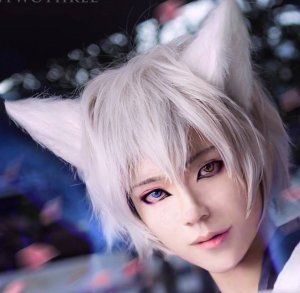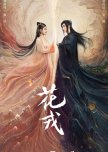It's Hard to be a Phoenix
"Beauty of Resilience" is an enchanting tale of love between a phoenix and a son of God, intertwined with themes of duty, sacrifice, and the pursuit of immortality. In a world where chaos looms over the three realms, the forbidden romance between a beautiful phoenix, disguised as a human girl, and a handsome young man, burdened with the task of ending her existence, takes center stage. As their love transcends time and challenges, they must navigate a treacherous path of love, loss, and the relentless pursuit of power. Unbeknownst to everyone, the fateful mission to kill the phoenix is driven by a personal obsession for immortality, setting the stage for a series of life-altering choices.
As the story unfolds, the true motivations behind the decree to kill the phoenix are revealed. It is discovered that the insatiable desire for immortality drives the selfish personal obsession of the one in power. The phoenix possesses a mysterious spirit flower called "hua rong", capable of enhancing its power and granting immortality. This misguided and deadly fixation wreaks havoc on the lives of the main characters, causing them to experience a rollercoaster of emotions, including love, hate, happiness, pain, gains, loss, togetherness, and separation, across multiple lifetimes.
Ju Jingyi delivers a convincing performance, taking on multiple roles throughout the series. As Wei Zhi, a humble and low self-esteemed maid servant with a mysterious power, she embarks on a journey that leads her to the cultivator academy. Her portrayal captures the essence of Wei Zhi's transformation into a phoenix, showcasing a delicate balance between strength and vulnerability. However, in her role as Sima Wangyue, a male military general, Ju Jingyi's feminine appearance becomes a noticeable aspect, though her ability to deceive the entire army is reminiscent of the conventions in Chinese cross-dressing dramas. Nevertheless, her overall performance remains commendable and believable, despite her lack of character change as she assumes the roles of the sacred lady of the demonic sect and the demon queen.
Guo Junchen's portrayal of Yan Yue is commendable, showcasing his versatility as an actor through multiple character interpretations. However, there are instances where the writing of his characters seems inconsistent and confusing. In his role as the conflicted lover tasked with killing the phoenix, his lack of emotional display during crucial moments leaves the audience longing for a deeper connection with his internal struggles.
The drama introduces several memorable supporting characters, adding depth to the storyline. Yi Er, portrayed by Lu Tingyu, captures hearts with her bubbly personality as an explorative cook betrothed to Yan Yue. Liu Dongqin's Mu Nan, the secret admirer turned demon chief who is unable to laugh, and Lin Fengsong's reluctant sit-in heavenly king, Yan Luo, also bring unique elements to the narrative. Additionally, Zhang Zhihao as Ou Ya, the wolf, and Song Xinran as Lan Su, the fox, add intrigue and depth to the story. On the other hand, the antagonists, portrayed as atrocious and hateful, provide a sense of relief when their fate is sealed. However, their actions also result in the loss of beloved side characters, which feels like a missed opportunity for more nuanced storytelling.
The drama excels in its authentic and visually stunning portrayal of the settings, costumes, and overall production design. While the headgears worn by Ju Jingyi may appear distracting in some scenes, the attention to detail and commitment to authenticity are praiseworthy.
My Verdict
One recurring flaw in the story lies in the characters' repetitive experiences and their failure to learn from past mistakes, resulting in a somewhat predictable narrative. Additionally, the presence of loose ends, plot holes, and weak logical explanations can detract from the overall viewing experience. The ending leaves certain aspects of the main characters' fate ambiguous, leaving the audience wondering if Wei Zhi and Yan Yue have returned to a time where their lives can begin anew without the burden of the phoenix. Furthermore, the conclusion for Yi Er feels far-fetched and some of the side characters' untimely deaths seem unnecessary, suggesting a lack of creativity in the writing process.
Despite these shortcomings, " Beauty of Resilience" remains an engaging drama, albeit with less humor and a heavier emphasis on evoking emotional responses from viewers. Although it may not have garnered favorable ratings on MDL, it still deserves recognition as a decent production with compelling performances and an intriguing storyline.
In conclusion, " Beauty of Resilience" is a captivating love story that explores themes of sacrifice and redemption within a fantastical realm. Its visually appealing aesthetics and committed performances make it a worthy addition to the genre. Don't miss the opportunity to experience this enchanting tale of love and fate.
As the story unfolds, the true motivations behind the decree to kill the phoenix are revealed. It is discovered that the insatiable desire for immortality drives the selfish personal obsession of the one in power. The phoenix possesses a mysterious spirit flower called "hua rong", capable of enhancing its power and granting immortality. This misguided and deadly fixation wreaks havoc on the lives of the main characters, causing them to experience a rollercoaster of emotions, including love, hate, happiness, pain, gains, loss, togetherness, and separation, across multiple lifetimes.
Ju Jingyi delivers a convincing performance, taking on multiple roles throughout the series. As Wei Zhi, a humble and low self-esteemed maid servant with a mysterious power, she embarks on a journey that leads her to the cultivator academy. Her portrayal captures the essence of Wei Zhi's transformation into a phoenix, showcasing a delicate balance between strength and vulnerability. However, in her role as Sima Wangyue, a male military general, Ju Jingyi's feminine appearance becomes a noticeable aspect, though her ability to deceive the entire army is reminiscent of the conventions in Chinese cross-dressing dramas. Nevertheless, her overall performance remains commendable and believable, despite her lack of character change as she assumes the roles of the sacred lady of the demonic sect and the demon queen.
Guo Junchen's portrayal of Yan Yue is commendable, showcasing his versatility as an actor through multiple character interpretations. However, there are instances where the writing of his characters seems inconsistent and confusing. In his role as the conflicted lover tasked with killing the phoenix, his lack of emotional display during crucial moments leaves the audience longing for a deeper connection with his internal struggles.
The drama introduces several memorable supporting characters, adding depth to the storyline. Yi Er, portrayed by Lu Tingyu, captures hearts with her bubbly personality as an explorative cook betrothed to Yan Yue. Liu Dongqin's Mu Nan, the secret admirer turned demon chief who is unable to laugh, and Lin Fengsong's reluctant sit-in heavenly king, Yan Luo, also bring unique elements to the narrative. Additionally, Zhang Zhihao as Ou Ya, the wolf, and Song Xinran as Lan Su, the fox, add intrigue and depth to the story. On the other hand, the antagonists, portrayed as atrocious and hateful, provide a sense of relief when their fate is sealed. However, their actions also result in the loss of beloved side characters, which feels like a missed opportunity for more nuanced storytelling.
The drama excels in its authentic and visually stunning portrayal of the settings, costumes, and overall production design. While the headgears worn by Ju Jingyi may appear distracting in some scenes, the attention to detail and commitment to authenticity are praiseworthy.
My Verdict
One recurring flaw in the story lies in the characters' repetitive experiences and their failure to learn from past mistakes, resulting in a somewhat predictable narrative. Additionally, the presence of loose ends, plot holes, and weak logical explanations can detract from the overall viewing experience. The ending leaves certain aspects of the main characters' fate ambiguous, leaving the audience wondering if Wei Zhi and Yan Yue have returned to a time where their lives can begin anew without the burden of the phoenix. Furthermore, the conclusion for Yi Er feels far-fetched and some of the side characters' untimely deaths seem unnecessary, suggesting a lack of creativity in the writing process.
Despite these shortcomings, " Beauty of Resilience" remains an engaging drama, albeit with less humor and a heavier emphasis on evoking emotional responses from viewers. Although it may not have garnered favorable ratings on MDL, it still deserves recognition as a decent production with compelling performances and an intriguing storyline.
In conclusion, " Beauty of Resilience" is a captivating love story that explores themes of sacrifice and redemption within a fantastical realm. Its visually appealing aesthetics and committed performances make it a worthy addition to the genre. Don't miss the opportunity to experience this enchanting tale of love and fate.
Considerați utilă această recenzie?


 1
1 5
5 1
1



















